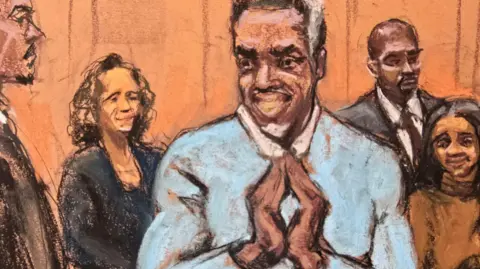The prosecution in Sean "Diddy" Combs's trial made its final case Thursday, arguing the music mogul used a business "kingdom", violence, drugs and fraud to coerce women into unwanted sex acts
"You've learned a lot about Sean Combs," Assistant US Attorney Christy Slavik told 12 New Yorkers on Thursday. "He's the leader of a criminal enterprise. He doesn't take no for an answer."
Combs has pleaded not guilty to charges of sex trafficking, racketeering and transportation to engage in prostitution.
For four hours, Ms Slavik reviewed seven weeks of evidence, accusing Combs of manipulating women into fulfilling his sexual fantasies with employees' help.
The rapper, wearing a cream sweater, watched, leaning back in his chair at the defence table, while his twin daughters and 85-year-old mother sat a few rows behind.
For the racketeering charges - the allegation that Mr Combs relied on a loyal network of employees to facilitate and conceal sex trafficking and other crimes - Ms Slavik reminded jurors that they needed to find Combs committed only two crimes through his "criminal enterprise".
She alleged he committed "hundreds" with the help of his employees.
Among those crimes, she included drug trafficking - when his employees allegedly procured drugs for him and others - as well as arson, when prosecutors say he hired someone to blow up musician Kid Cudi's car.
But the "brutal crimes at the heart of the case" were sex trafficking, Ms Slavik said, citing harrowing testimony from two of Combs' ex girlfriends, Casandra Ventura and "Jane".
They had testified Combs manipulated them into participating in freak-offs - having sex with a male escort while Combs watched and filmed. Combs used repeated beatings to coerce Ms Ventura into the unwanted sex acts, Ms Slavik said - a rebuttal to the defence's main argument that Combs' domestic violence did not amount to sex trafficking.
"The cloud of abuse was hanging over Cassie's head - always hovering," she said.
Jurors again watched the viral 2016 video of Mr Combs beating Ms Ventura in a Los Angeles hotel hallway, attempting to drag her back to a room, allegedly after she tried to leave a freak-off.
Combs kept his head down and his daughters shifted in their seats as jurors were shown the footage, played repeatedly during ther trial.
"This is what happened when Cassie said no," Ms Slavik told the court.
The video is particularly effective in helping prosecutors turn theoretical sex trafficking arguments into something more concrete, said Mitchell Epner, a New York-based lawyer and former prosecutor.
"The government is doing a very good job saying that these particular incidents on these particular days constituted sex trafficking," he said.
Ms Slavik also described other ways Combs allegedly coerced the women into unwanted sex, including "plying" them with copious amounts of drugs, and in the case of Jane, refusing to pay her rent if she did not comply.

She cited texts from Jane telling the rapper she did not want to participate and that she was "in fear of losing the roof over my head".
The prosecution was not there to "criminalize dysfunctional relationships" or criticize "unconventional sex lives", she told jurors. Combs' lawyers have argued he participated in a "swingers" lifestyle.
"Cassie and Jane did not want to have sex with escorts while the defendant watched," Ms Slavik said.
The government's summation did what it needed to do, said Anna Cominsky, associate professor at New York Law School.
"They have marshaled the evidence - walked the jury through their case and told them the significance of each piece of evidence."
The 12 jurors could begin deliberations on Combs' fate as soon as Friday. His lawyers are set to give closing arguments then, after which the judge will instruct the jurors on its deliberations.
Earlier this week, Combs' legal team rested its case after about 20 minutes, introducing text messages from Jane, but calling no witnesses.
Combs faces a maximum sentence of life in prison if convicted of the most serious charges of sex trafficking and racketeering.
BBC





